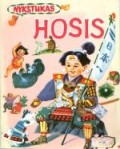 Translated by:
Translated by:
Ališauskas, Arvydas
This is children’s book, published in 1976. It is one of the first direct translations from Japanese in Lithuania made by Arvydas Ališauskas.
 Authors:
Authors:
Oe, Kenzaburo
Translated by:
Žemaitis, Jonas
Translated from:
Russian
Published on:
1975
“The late youth” – postwar Japanese generation “late” to the war, which ended in 1945. In the novel, which was first released in 1961, Oe depicts Japanese youth, realistically, without any usual decorations shows bourgeois reality. The novel is written is the first person, allowing the reader to take a deeper look into the main character’s (whose name, in fact, is never revealed throughout the book) inside and allows the character to speak absolutely openly, showing his most secret … More
 Authors:
Authors:
Abe, Kōbō
Translated by:
Lenkauskienė, Dalia
Translated from:
Russian
Published on:
1973
Kobo Abe is the worlds famous novelist-romanist. He is one of the best known japanese writers from the postwar period. When Kobo Abe become intrested in sci-fi, he stars to create philosophical sciense fiction works „ The crime of S. Karuma“, „Inventions by No.R62” etc. Also he is writing about actualities from that time. He traveled through socialistic Eastern Europe and created one of the best known novels “The woman in the dunes”. His peculiar and original style shown himself in … More
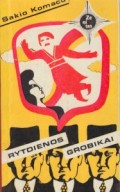 Authors:
Authors:
Komatsu, Sakyo
Translated by:
Ališauskas, Arvydas
Translated from:
Japanese
Published on:
1973
A novel titled “The Plunderers of Tomorrow” by Japanese writer Sakyo Komatsu, tells a story about Yuzo Toda – a regular worker of a huge Japanese enterprise. He generally shares similar everyday problems to most of people in his social and economic status: stress at work, quarrels with his fiancee and lack of money. However, after accidentally running into a being from another planet fate of the whole Earth fell into his hands. The main character who used to ironically complain about his monotonous life faces radical changes: he can no longer keep thinking about the issues of our planet like he is outside of them – from now on his decisions determine everything. More
 Translated by:
Translated by:
Jurgaitė, Alma
Translated from:
German
Published on:
1973
“Chinese fairy tales” is a collection of 34 traditional Chinese stories, that helps us to discover this country through its tales. Surprisingly, it has many similarities to the Lithuanian fairy tales — the hero is often a poor orphan girl, abused by her evil stepmother or a brave young man facing all the challenges with courage alone. Virtue and selflessness always wins while greedy rich folk get what they deserve. Many of these stories are about love and how it might be lost forever if … More
 Authors:
Authors:
Ogava, Pimei
Translated by:
Ališauskas, Arvydas
Translated from:
English
Published on:
1971
Japanese fables collection called „Wild Roses“ – is a great way to have a look at Japanese culture, analyze the folk moral values and life wisdom. The fables – a specific genre that is easy to read and that lets the reader to be acquainted with Japanese mythology and other fantastic things.
In this collection there are plenty of instructive stories. These stories have a concealed moral that teaches the reader to be More
 Authors:
Authors:
Endo, Shusaku
Translated by:
Bufas, Viktoras
Translated from:
Japanese
Published on:
1970
This book contains two short stories. In the first story “Family Life” author presents a strong and cohesive family as a morally healthy society. The second short story, “The woman that I lost” is about modern Japanese society condemns selfishness steals.
Japanese writer Shusaku Endo his first short story divides into novels. Each novel tells the stories of individual families, examining the family stories. The writer describes a very subtle man and woman dreams of marital happiness. More
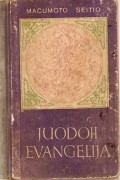 Authors:
Authors:
Matsumoto, Seicho
Translated by:
Vaišnoras, Juozas
Translated from:
Russian
Published on:
1969
„Black gospel“ is one of the first Macumoto Seitio books, translated in Lithuanian language. This is two part, emotional novel with detective elements.
The novel action is developing at postwar period in Tokyo, Japan. In this story is critically presented about the Christianity spreading time in Japan and about Church activities in the country. Also in the book is inserted a lot descriptions about Tokyo city and public citizens life. The novel is conveyed through several people\’s life‘s and experience. All story is told by third person position, with a lot of emotional feelings and descriptions of surroundings. Some times we can find subtle mentions about the mood of the narrator: irony, displeasure or sorrow. More
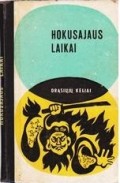 Authors:
Authors:
Takahashi, Yasukuni, Kita, Morio, Hoshi, Shinnichi, Mitsuse, Ryū, Komatsu, Sakio
Translated by:
Ambrasas, Kazys
Translated from:
Japanese
Published on:
1969
Authors in the book “Hokusai Times” are writing about a variety of different Japanese fiction stories. The book is not only one single story, the book is rich and full of many different fantastic adventures. The stories hold and reflect Japanese cultural manifestations, and most stories of the book – different author’s imagination.
While reading the book we can notice many different types of stories, from love stories, comedies to criminal stories. The book itself is interesting and attractive, especially for fiction fanatics. The book is dominated by stories about cosmos, space, planets, time machines. Every story is unique, written by detail and requires focus to understand. More
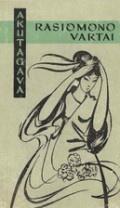 Authors:
Authors:
Akutagawa, Ryuunosuke
Translated by:
Rudokas, Vytautas
Translated from:
Russian
Published on:
1965
In this book we can find philosophical reflections on human life and at the same time Japan’s domestic life episodes, people relationships and so on. Novels are short ones, because of the long-lived Japanese verbal creativity roots. During Akutagawa writing period, Japanese literature at the same time was into naturalism. All this reflected in the creativity part. His works takes a really important place in Japanese literature: after he died his creations was fully released and was established Akutagawa’s name literary prize, which is given annually to a young writer every year… All this shows how great is seen Akutagawa’s name in the new literature of Japanese culture. A lot of short stories are connected with Japanese religions. More
 Translated by:
Ališauskas, Arvydas
Translated by:
Ališauskas, Arvydas 
 Authors:
Oe, Kenzaburo
Authors:
Oe, Kenzaburo  Authors:
Abe, Kōbō
Authors:
Abe, Kōbō  Authors:
Komatsu, Sakyo
Authors:
Komatsu, Sakyo  Translated by:
Jurgaitė, Alma
Translated by:
Jurgaitė, Alma  Authors:
Ogava, Pimei
Authors:
Ogava, Pimei  Authors:
Endo, Shusaku
Authors:
Endo, Shusaku  Authors:
Matsumoto, Seicho
Authors:
Matsumoto, Seicho  Authors:
Takahashi, Yasukuni, Kita, Morio, Hoshi, Shinnichi, Mitsuse, Ryū, Komatsu, Sakio
Authors:
Takahashi, Yasukuni, Kita, Morio, Hoshi, Shinnichi, Mitsuse, Ryū, Komatsu, Sakio  Authors:
Akutagawa, Ryuunosuke
Authors:
Akutagawa, Ryuunosuke